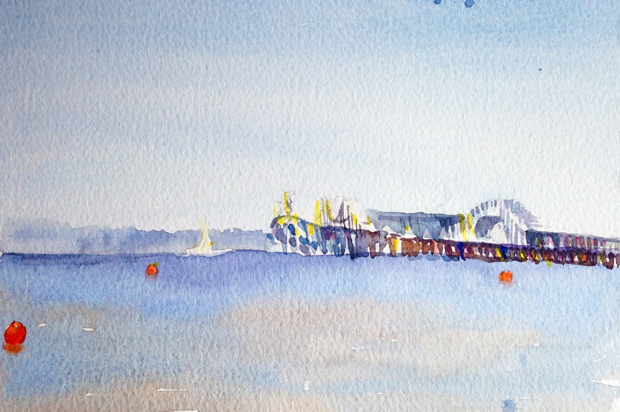Part of living into new stories of connection and belonging is to recognize that our body is an incredible gift, an ally in this life, and a teacher. Recently, in the middle of a particularly grueling interval training class at the gym, this thought hit me: the only way to become the sort of person who can do these exercises is to do them. In one of the cruelly brief breaks between stations, I mentioned it to the class leader. Joking as I struggled to catch my breath that it’s a good lesson for life. She said, not only that, but you’re not supposed to get good at the exercises. It works this way: as soon as you can do them, you have to find a way to challenge yourself again. You always want to be reaching to the point of failure.
Reaching to the point of failure is the opposite of how I was raised. I was taught that whatever you do, at all costs, never, never, ever fail. Play it safe, go easy, don’t make waves, toe the line, do what you’re told. Oh, and excel at things. At everything you try, preferably. Bonus points for making it look easy. If you can’t excel, don’t try it. If this sounds unfamiliar and sadly neurotic to you, congratulations. You’re probably better equipped to live in these crazy times than I am. My inherited aversion to risk seems related to my disconnection from my body. Both come from and engender a lack of trust.
Yesterday, in a spin class taught by an admirably buff, serious road racer, we did a ton of heavy-load sprints that had me clock-watching after the first ten minutes. It was the longest 45-minute spin class I’ve ever taken. For one particularly nasty series of uphill bursts, he kept exhorting us to, “work past your maximum.” Not being familiar with the lingo, I took it to mean sprint up those hills pushing it as hard as you can—and then push even harder.
Many years ago, I started getting intuitive messages about my body. During meditation, I would hear, “Your body is your chariot,” and “Your body is the key to your becoming.” Being an intellectual who treated my body as a scaffold for carrying my head around, it took quite a while for me to understand what this meant. I’m grateful that I was moved to trust this guidance, even though it didn’t make sense to me rationally. Since then, yoga, exercise, stillness and healthy eating have shown me so many aspects of myself that were unknown and unavailable to me before. My body has led me to explore many new worlds and depths.
“Stop on a daily basis… and love every inch of the human body that you wear over your Light. It is easy to love whales, trees and rainbows, but not so easy to love your humanness… every ache, pain, bone and hair, every iota of you inside and out. By not loving your humanness, your earthiness, the cells, organs, hairs and wrinkles, you are not loving your Mother Earth. You can heal her only by loving YOU.” – Buffalo Calf Woman
I haven’t yet read Philip Shepherd’s book, New Self, New World: Recovering Our Senses in the Twenty First Century, but in an interview about it he has much to say about the wonders of the body and the senses, and the many pathways to listening and learning via the body. Like this gem:
“Our story insists that our thinking happens exclusively in the head. And so we are stuck in the cranium, unable to open the door to the body and join its thinking. The best we can do is put our ear to the imaginary wall separating us from it and “listen to the body,” a phrase that means well but actually keeps us in the head, gathering information from the outside. But the body is not outside. The body is you. We are missing the experience of our own being.”
Both of those recent experiences at the gym have me looking differently at the way I approach my work. Distilling the lessons from two seasoned pros, plus a few from my longtime yoga teacher, here is some advice I’m inspired to live by:
- Do the work to be able to do the work.
- Push past your limits in a healthy, joyful way. Be curious.
- You can always do more than you think you can.
- As soon as you feel comfortable at that level, find a more difficult challenge. If it seems impossible, it’s probably a good one to try.
- Working past limits helps build strength and endurance, which you can use to weather challenges.
- It’s natural to have limits, so never despair when you find them in yourself.
- When you are integrated and centered, you can open and expand more fully.
- There is always more.
I appreciate these and other lessons that exercise and movement have taught me. This wisdom doesn’t resonate intellectually from the pages of a book, but from real, physical experiences that are stored in my body and coded into my very cells. The only way to be better at anything is to do it. To be a better writer, I must write. And constantly look for ways to push myself past my limits (which are easy to find at this point!). I don’t have to be embarrassed when I come up against those frontiers and limitations as a writer or a yogini or a gym rat. Everyone has them. They are natural and unique to each of us, an open invitation to deeper appreciation for the chariot that is the body.

